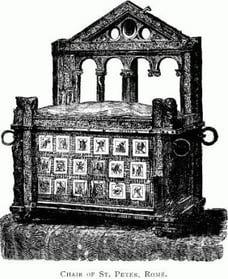 Scripture: Lectionary 229, Feb.22. Ezekiel 18:21-28. Psalm 130:1-2,3-4,4-6,7-8. Matthew 5:20-26:
Scripture: Lectionary 229, Feb.22. Ezekiel 18:21-28. Psalm 130:1-2,3-4,4-6,7-8. Matthew 5:20-26:
Ezekiel is a fascinating prophet who puts his message into actions which are like living parables. Today, however, he gives us a new look from the prior one that often put the blame of someone’s sickness or failures on the parents. We see that even in the time of Jesus the apostles ask Jesus about the blind man who is healed, “Who sinned this man or his parents?” Ezekiel strongly asserts the responsibility of the individual person for the good he or she does as well as for the bad or the sins that they commit. Responsibility rests with oneself; it does not redound to parents or others. This is common sense, but it was Ezekiel who broke through the old myths about sickness and sin in his time. Jesus affirms Ezekiel’s position in chapter nine of John’s Gospel that deals with the healing of a blind man. We know that when we do wrong it is due to our bad decision- making or our giving into a temptation. We cannot blame others for our failings though we often do; we thenearch for years till we finally realize we have to accept who we are and live with our good self and our shadow side. Our sins belong to us and we cannot lay the blame on our parents, relatives, or brothers and sisters. Ezekiel had it right and used his prophetic common sense. He would have been a very good psychologist.
Psalm 130 is one of the penitential psalms. As we have recently learned there are seven of them. These are excellent prayers for Lent. We pray with the psalmist that our sins will not be heaped upon our heads by God through God’s judgment upon us. We acknowledge our failings and sins; God forgives us up to seventy times seven each day. The seven penitential psalms are : 6, 32, 38, 51, 130,and 143. The Sermon on the Mount is the background for many of our Gospel readings during Lent. This is a great blueprint for living our lives in union with Jesus who proclaimed this inspiring sermon according to Matthew in chapters 5-7. These chapters are worthwhile reviewing several times during Lent since they speak of prayer, fasting, almsgiving, judging, being merciful, etc. as we learn in the beatitudes, the grand opening of the Sermon on the Mount (Matthew 5:1-12). We learn today that our conscience needs to be informed and perfected by means of the values contained in this magna carta for our spiritual life. We are especially encouraged to keep our relationships going. They are to be wholesome and uplifting. Our neighbor is primarily the concern of the beatitudes and of our growth into the likeness of Christ. We should avoid any name calling and prejudicial remarks about another. Sarcasm can hurt another person deeply; that too is a no no! Our holiness must surpass simply the living out of rules or performing just the minimal requirements of the ten commandments. If we do this we will understand the words of today’s psalm: “For with the Lord is kindness and with him is plenteous redemption; God will redeem us from all our iniquities.” Amen.
Copyright 2013 Fr. Bertrand Buby, S.M.
About the Author

Guest
We welcome guest contributors who graciously volunteer their writing for our readers. Please support our guest writers by visiting their sites, purchasing their work, and leaving comments to thank them for sharing their gifts here on CatholicMom.com. To inquire about serving as a guest contributor, contact editor@CatholicMom.com.


.png?width=1806&height=731&name=CatholicMom_hcfm_logo1_pos_871c_2728c%20(002).png)
Comments